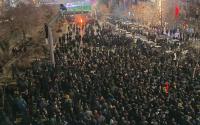29 June 2006Donald Macintyre
As a textbook example of hi-tech precision bombardment it could hardly be improved. Smoke was still rising yesterday from the scorched wreckage of the six transformers at Gaza's only power station, each destroyed by a single missile fired by an Israeli warplane some 10 hours earlier.
Had they hit the huge cylindrical diesel tank 100 metres away they would have set the whole power station alight. But the strike was clinically effective, cutting all the electricity to 700,000 Gaza consumers, threatening water supplies and depriving its public of light, cooking, broadcast news, and a crucial issue in scorching summer temperatures fans.
"I'm so surprised that they did this," said Dr Derar Abu Sisi, the operations manager at the Al Nusirat power station. "We have been right through the worst of the intifada but this didn't happen." It would, Dr Abu Sisi said, take a "minimum of three to six months" to restore supplies at a cost between $5m (£2.8m) and $7m. "The Geneva Convention says it is not allowed to attack infrastructure for the civilian people," he added. "You might expect that economic infrastructure could be a target in the last stages of a war. But this is not like that."
The damage to Gaza's power supply was condemned as "unacceptable and barbaric collective punishment of civilians, including women, children and old people" by the office of Mahmoud Abbas, which complained it was intensifying what it says are the difficulties he already faces in trying to secure the safe release of Gilad Shalit, the 19-year-old Israeli army corporal abducted by militants including members of Hamas's military wing on Sunday.
The crisis escalated yesterday as Hamas called for the prisoner swap Israel has so far refused to entertain; another faction responsible for Cpl Shalit's abduction, the Popular Resistance Committees, threatened to kill Eliahu Asheri, 18, a settler it says it is holding, if Israel does not end its military campaign in Gaza, and a third, the al-Aqsa Martyrs, claimed to have seized a 62-year-old man from the central Israeli city of Rishon Lezion.
In retaliation, Israeli soldiers last night arrested the Labour Minister, Mohammed Barghouthi, a member of the Hamas-led Palestinian government, in the West Bank city of Ramallah, Palestinian security officials said.
The army fired a barrage of artillery rounds into northern Gaza throughout the night, including at the Islamic University in Gaza City, as it prepared to tell local residents to leave their homes before moving in force into Beit Hanoun to attack Qassam rocket launching units.
Roads in the southern Gaza city of Khan Younis were also targeted. The Israeli army said they were to prevent the kidnapped soldier being moved and to cut off access to militants launching rockets at Israel.
Ehud Olmert, the Israeli Prime Minister, said that the army would not hesitate to carry out "extreme action" in the coming days to bring the abducted soldier back to his family.
The aerial attack on the power station was one of four conducted early yesterday. The other three were on bridges in central Gaza, which the Israel Defence Forces said were intended to hamper attempts by Cpl Shalit's captors to move him from the south to the north.
Yesterday, however, a side road alongside the most easterly of these, which fords the currently dried-up river running through the Wadi Gaza on the main north-south Salahadin road, was busy with traffic which had turned off to avoid the wrecked bridge and continue its journey unimpeded towards Gaza City from the south.
Another target was an old railway bridge 200 metres to the west, which the army says can be used by vehicles but which carried a now-broken water pipeline to two refugee camps.
Zakri al-Ouh, 62, a construction worker who lives near by and helped to build the two-lane road bridge under Egyptian supervision in 1965 and 1966, said: "When it rains then it will be impossible to use the road, but at the moment I can't see how this can help the soldier."
He added: "At first I was in favour of handing back the soldier as quickly as possible. We have to consider the power of Israel against our own weakness.
"But now they have done this I think there should be an exchange of prisoners before he is handed back." The southernmost town of Rafah to which roads were notably less crowded than usual yesterday still has power because it takes its electricity from Israel.
But Rafah, which had most to gain from Israel's withdrawal last August because it had been the most ravaged in all of the occupied territories during four years of the intifada, now fears a return of conflict.
Yesterday morning, with Israeli troops and tanks now occupying the disused airport two kilometres from the town centre, Maher Abu Ermana 21, was doing a brisk trade in sacks of flour, oil, sugar and beans provided by aid agencies, sold to him by impoverished refugee recipients trying to make a few extra shekels, and invariably labelled "not for resale".
Such is Gaza's dysfunctional economic cycle that Mr Abu Ermana is now selling his wares to customers stocking up in fear of war shortages. Up until two days ago, after Cpl Gilad Shalit was abducted, he said: "I was selling two sacks a day. Now I am selling 20 to 40."
"We are all worried," said Zakia Mahmoud, 40, who has 10 children. "I hope it will not return to what it was before. If it does, we will lose half of our sons."
The most audible element of the "message" Israel says it is delivering to Gaza in the hope of securing the safe release of Cpl Shalit in the event of which it says it will pull back its forces from the Strip are the sonic booms produced by warplanes deliberately flying faster than the speed of sound over Gaza.
Yesterday's booms which produce the shattering sound of a heavy explosion in the immediate vicinity started at 5am and were the first for several months, after two human rights groups filed a High Court petition saying that they constituted an illegal "collective punishment".
But the most powerful impact of Israel's so far "specific and limited" military campaign is likely to be power cuts. Gaza City's main Shifa hospital said its generator was working 24 hours a day but because of fuel shortages could keep going for only two weeks.
Mark Regev, the Israeli Foreign Ministry spokesman, insisted the attacks on power stations and bridges were justified by the need to bring out Cpl Shalit alive.
The Israeli human rights agency Btselem warned that the power cuts would jeopardise water supplies and health care. It stressed that Israel had the right to enact "all legal measures" to secure the release of Cpl Shalit but not those which conflict with international humanitarian law prohibitions against "objects indispensable to the survival of the civilian population".






